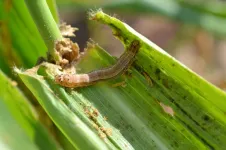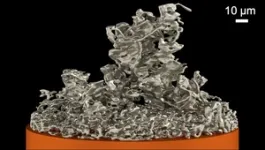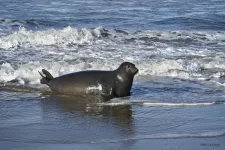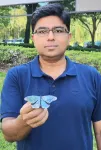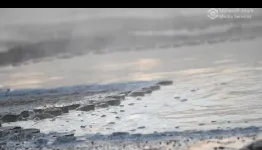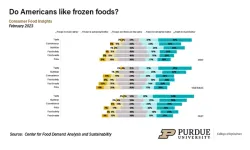(Press-News.org) A review, conducted by CABI scientist Dr Marc Kenis suggests that the parasitoid Eiphosoma laphygmae is likely to be the best classical biological control from the Americas against the devastating fall armyworm pest.
Dr Kenis, Head of Risk Analysis and Invasion Ecology based at CABI’s Swiss centre in Delémont, evaluated the prospects and constraints of a classical biological control programme to fight the fall armyworm (Spodoptera frugiperda) using larval parasitoids which are considered the most suitable natural enemies of the pest.
His findings are published in the Journal of Economic Entomology.
The fall armyworm – which originates from tropical and subtropical areas of the Americas – is a highly destructive pest of over 350 plant species, though it favours staple foods of millions including maize, rice and sorghum.
A previous review led by Dr Kenis and published in Entomologia Generalis, provided a comprehensive study of the fall armyworm including details on its invasiveness, biology, ecology and management. It involved 57 scientists from 46 different institutions.
The paper highlighted that, according to Eschen et al. (2021), fall armyworm causes estimated annual yield losses of USD $9.4 billion in Africa alone. It adds that the invasion of the pest in developing countries has an important impact on household income and food security.
In the latest review, Dr Kenis said the most important larval parasitoids in its native range are presented and discussed for their suitability as CBC agents, based the following criteria: their frequency of occurrence and parasitism levels, specificity, climatic suitability and absence of closely related species parasitizing the fall armyworm in the area of introduction.
Other parasitoids looked at included Aleiodes laphygmae, Archytas marmoratus, Campoletis spp. and Cotesia marginiventris.
Dr Kenis said, “The ichneumonid Eiphosoma laphygmae Costa-Lima (Hymenoptera: Icheumonidae) is considered as a potential candidate for introduction because of its specificity and its importance as a parasitoid of the pest in most of its native range.
“The most frequent and important parasitoid of S. frugiperda in the Americas, the braconid Chelonus insularis Cresson (Hymenoptera: Braconidae), would most probably contribute to the control of S. frugiperda if released in invaded areas. However, it is oligophagous and would most certainly parasitize nontarget species.”
He added that before introducing C. insularis, or any other parasitoid species, the potential non-target effects will have to be assessed and the risks will have to be weighed against the benefits of improving the natural control of this important pest.
Other CABI research to try and mitigate the fall armyworm has included a former PhD student, Patrick Fallet, from the University of Neuchâtel and CABI in Switzerland, testing numerous nematode formulations applied into the maize whorl. These have proved just as effective as pesticide sprays.
Meanwhile, scientists from the MARA China-CABI Joint Laboratory for Biosafety and MARA China-CABI European Laboratory are working to find sustainable and effective natural enemies for the fall armyworm with 70 options identified in China alone.
These include 44 predators such as Pentatomidae, Lygaeidae, Anthocoridae, Nabidae, Coccinellidae, Reduviidae, Chrysopidae, Forficulidae, Formicidae and Vespidae species. Bugs and beetles constitute 68% of the predators.
Additional information
Main image: The fall armyworm (Spodoptera frugiperda) (Credit: CABI).
Full paper reference
Kenis, M., ‘Prospects for classical biological control of Spodoptera frugiperda (Ledipoptera: Noctuidae) in invaded areas using parasitoids from the Americas,’ 9 March 2023, Journal of Economic Entomology, DOI: 10.1093/jee/toad029
The paper can be read open access here once the embargo has lifted: https://doi.org/10.1093/jee/toad029
Funding acknowledgement
This study was financially supported by the Foreign, Commonwealth and Development Office (FCDO), UK, the Directorate-General for International Cooperation (DGIS), Netherlands, the European Commission Directorate-General for International Cooperation and Development (DEVCO), and the Swiss Agency for Development and Cooperation (SDC) through the CABI PlantwisePlus programme.
Other relevant stories and blogs
See also the stories and blogs ‘CABI and MARA scientists explore collaboration to find effective natural enemies for devastating Fall armyworm,’ as well as ‘CABI-led study provides comprehensive review of devastating fall armyworm pest’ and ‘Almost all of Africa’s maize crops is at risk from devastating fall armyworm pest, study reveals.’
Find out more about the Fall armyworm from the Fall armyworm Research Collaboration Portal and the Fall armyworm Information Portal.
END
Eiphosoma laphygmae likely to be best classical biological control against devastating fall armyworm pest
A review, conducted by CABI scientist Dr Marc Kenis suggests that the parasitoid Eiphosoma laphygmae is likely to be the best classical biological control from the Americas against the devastating fall armyworm pest
2023-03-09
ELSE PRESS RELEASES FROM THIS DATE:
Ultra-soft and highly stretchable hydrogel-based sensor for monitoring overactive bladder
2023-03-09
Modern living seems to have exacerbated the conditions of our gut. There is an escalating prevalence of irritable bowel syndrome and overactive bladder syndrome among individuals who do not exhibit signs of infectious maladies or other established ailments, but rather report experiencing sudden symptoms. Recently, a team of researchers from POSTECH and Korea Advanced Institute of Science and Technology (KAIST) have proposed a sensor to monitor overactive bladders.
The research team consisting of Professor Sung-Min Park and Young-Soo ...
Toxic Twitter abuse could skew UK wildlife law
2023-03-09
Wildlife conservation efforts could suffer because toxic online rows about trophy hunting are becoming increasingly abusive, ecologists have warned.
Scientists analysed hundreds of tweets about trophy hunting and found that 7% were abusive. This is a similar proportion to content on partisan topics on social media platforms known to highlight extreme viewpoints.
The findings, by conservation scientists at the University of Reading and the University of Sheffield, are published today (9 March) in the journal ...
Racial bias in artificial intelligence restricts vital access to healthcare and financial services, says data scientist
2023-03-09
These are just some examples given by a leading data science expert who has analyzed the depths of systemic racism in AI and suggested the ways in which the biases can be confronted.
A pervasive threat
Artificial intelligence is a pervasive part of modern-day life and is used by vital institutions from banks to police forces.
But a growing mountain of evidence suggests that the AI used by these organizations can entrench systemic racism.
This can negatively impact Black and ethnic minority groups when applying ...
Aston University and the British Council to help boost global number of female photonics experts
2023-03-08
Aston University to support more women carve out a career in photonics
Three new grants available for women from eligible countries across east Asia
Scholarships will be based in the College of Engineering and Physical Sciences.
Aston University and the British Council are aiming to support more women carve out a career in photonics.
The British Council is funding three grants for women who have recently completed a PhD or equivalent and are from eligible countries across east Asia.
This scholarship programme aims to increase opportunities in science, technology, engineering and maths (STEM) for women.
According ...
Marine mammal reproduction rests on a precarious tipping point of ocean resources
2023-03-08
Changing environmental conditions may threaten marine mammal populations by making it harder to find prey, and a new study shows how small, gradual reductions in prey could have profound implications for animal populations.
The reproductive success of female elephant seals depends on their ability to find prey and put on weight during their months-long foraging migrations. Researchers at UC Santa Cruz studied the relationships between elephant seal behavioral strategies in the open ocean, weight gain, and lifetime success at producing pups.
Their findings, published March 8 in Ecology Letters, reveal a sharp threshold in the relationship between ...
UCF researcher creates world’s first energy-saving paint – inspired by butterflies
2023-03-08
–EMBARGOED:
NOT FOR RELEASE UNTIL 2:00 p.m. EST, WEDNESDAY, 08 MARCH 2023–
UNIVERSITY OF CENTRAL FLORIDA
UCF Researcher Creates World’s First Energy-saving Paint – Inspired by Butterflies
Instead of pigment-based colored paint, which requires artificially synthesized molecules, a UCF researcher has developed an alternative way to produce colored paint that is more natural, environmentally friendly and light weight.
ORLANDO, March 8, 2023 — University of Central Florida researcher Debashis Chanda, a professor in UCF’s NanoScience Technology Center, has drawn inspiration from butterflies to create the first environmentally ...
Researchers discover how too much oxygen damages cells and tissues
2023-03-08
SAN FRANCISCO, CA—March 8, 2023—When it comes to oxygen, you can have too much of a good thing. Breathing air that contains higher levels of oxygen than the usual 21 percent found in Earth’s atmosphere can cause organ damage, seizures, and even death in people and animals, particularly if it’s in excess of the body’s oxygen needs. Until now, however, scientists have mostly speculated about the mechanisms behind this phenomenon, known as oxygen toxicity, or hyperoxia.
Now, researchers at Gladstone Institutes have discovered how excess oxygen changes a handful of proteins in our cells that ...
Colorectal cancer research
2023-03-08
Excessive iron absorption by tumor cells in the digestive tract is known to play a major role in driving colorectal cancer – the third most prevalent and third leading cause of cancer deaths in the U.S.
In a new study published in the journal Advanced Science, University of New Mexico researchers describe the part played by the transferrin receptor (TFRC) gene in the growth of colorectal cancer tumors.
Iron is absorbed into intestinal cells both from the bloodstream and from iron-rich foods, such as red meat, said Xiang Xue, PhD, assistant professor ...
A pool at Yellowstone is a thumping thermometer
2023-03-08
While the crowds swarm around Old Faithful to wait for its next eruption, a little pool just north of Yellowstone National Park’s most famous geyser is quietly showing off its own unique activity, also at more-or-less regular showtimes. Instead of erupting in a towering geyser, though, Doublet Pool cranks up the bass every 20 to 30 minutes by thumping. The water vibrates and the ground shakes.
Doublet Pool’s regular thumping is more than just an interesting tourist attraction. A new study led by University of Utah researchers shows that the ...
Americans planning frugal uses for their 2023 tax refunds
2023-03-08
WEST LAFAYETTE, Ind. — Americans likely are receiving smaller tax refunds than they have in recent years, and most people will not be going out to spend this money, according to the February 2023 Consumer Food Insights Report. This month’s report also looks more closely at religious demographics and includes new data on frozen food preferences.
The survey-based report out of Purdue University’s Center for Food Demand Analysis and Sustainability assesses food spending, ...
LAST 30 PRESS RELEASES:
COVID-19 vaccination during pregnancy may help prevent preeclampsia
Menopausal hormone therapy not linked to increased risk of death
Chronic shortage of family doctors in England, reveals BMJ analysis
Booster jabs reduce the risks of COVID-19 deaths, study finds
Screening increases survival rate for stage IV breast cancer by 60%
ACC announces inaugural fellow for the Thad and Gerry Waites Rural Cardiovascular Research Fellowship
University of Oklahoma researchers develop durable hybrid materials for faster radiation detection
Medicaid disenrollment spikes at age 19, study finds
Turning agricultural waste into advanced materials: Review highlights how torrefaction could power a sustainable carbon future
New study warns emerging pollutants in livestock and aquaculture waste may threaten ecosystems and public health
Integrated rice–aquatic farming systems may hold the key to smarter nitrogen use and lower agricultural emissions
Hope for global banana farming in genetic discovery
Mirror image pheromones help beetles swipe right
Prenatal lead exposure related to worse cognitive function in adults
Research alert: Understanding substance use across the full spectrum of sexual identity
Pekingese, Shih Tzu and Staffordshire Bull Terrier among twelve dog breeds at risk of serious breathing condition
Selected dog breeds with most breathing trouble identified in new study
Interplay of class and gender may influence social judgments differently between cultures
Pollen counts can be predicted by machine learning models using meteorological data with more than 80% accuracy even a week ahead, for both grass and birch tree pollen, which could be key in effective
Rewriting our understanding of early hominin dispersal to Eurasia
Rising simultaneous wildfire risk compromises international firefighting efforts
Honey bee "dance floors" can be accurately located with a new method, mapping where in the hive forager bees perform waggle dances to signal the location of pollen and nectar for their nestmates
Exercise and nutritional drinks can reduce the need for care in dementia
Michelson Medical Research Foundation awards $750,000 to rising immunology leaders
SfN announces Early Career Policy Ambassadors Class of 2026
Spiritual practices strongly associated with reduced risk for hazardous alcohol and drug use
Novel vaccine protects against C. diff disease and recurrence
An “electrical” circadian clock balances growth between shoots and roots
Largest study of rare skin cancer in Mexican patients shows its more complex than previously thought
Colonists dredged away Sydney’s natural oyster reefs. Now science knows how best to restore them.
[Press-News.org] Eiphosoma laphygmae likely to be best classical biological control against devastating fall armyworm pestA review, conducted by CABI scientist Dr Marc Kenis suggests that the parasitoid Eiphosoma laphygmae is likely to be the best classical biological control from the Americas against the devastating fall armyworm pest
